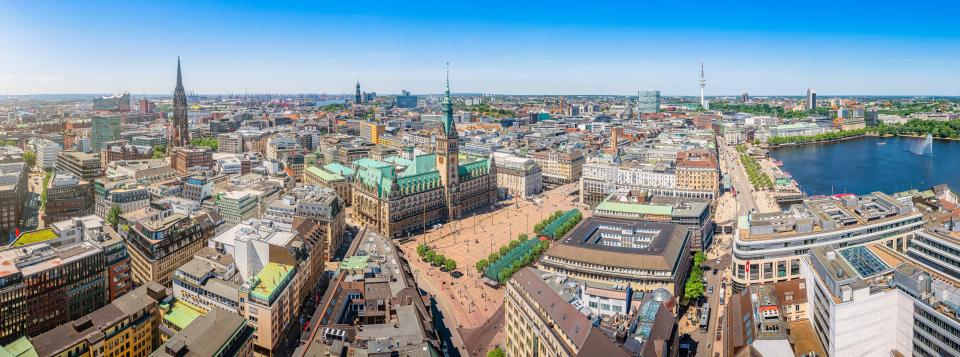- Statutory (or public) health insurance with Techniker Krankenkasse (TK)
- Private health insurance with DR-WALTER
You can use our private insurance in the period before enrollment at your university and before the start of your TK health insurance coverage. The German embassy/consulate also accepts DR-WALTER's health insurance for the application of a student visa.
ℹ️ If you have to complete a preparatory course (Studienkolleg) or a German course before enrolling in your studies, you must take out private health insurance during this time. This is because the statutory insurance only covers you as long as you are officially enrolled at the university. Once you have completed your course, you can easily switch to public health insurance.
Open a German bank account
ℹ️ Before you can open a bank account, you need a registration certificate ("Anmeldung") from the Residents' Registration Office. Only if you prove to the bank that you live in Germany will they open an account for you.
Opening an account is now possible online at most banks in Germany. This should take no longer than 10 minutes. As part of the account application, banks usually ask for personal data such as name, place of residence, marital status, and nationality. Find out more about how to set up a current bank account in Germany.
Direct banks are the cheapest
Direct banks are banks without their own branch network. Transfers and standing orders can be made via online banking. You can also find and download account statements online. Direct banks offer the cheapest checking accounts, and cash withdrawals in Germany and abroad are often free of charge.
What documents are required to open an account?
- Valid passport
- Certificate of registration in Germany / proof of residence
ℹ️ Nationals of countries not members of the European Union may be required to present their residence permit in Germany to open an account.
- If necessary, the reason for residence must be presented (e.g., in the case of students, a certificate of matriculation).
Find a cheap German internet provider
Usually, students' budgets are tight, and several want to split an access point in a shared apartment or need internet for their studies. Wi-Fi is, of course, standard.
ℹ️ DSL rates specifically for students allow you to get broadband internet at a fair price. For this, students often have to present a certificate of enrollment as proof after ordering the contract to receive the discount.
Here is a list of popular internet providers in Germany:
❇️ We recommend that you check them for student rates and choose the one that's right for you!
ℹ️ When you start comparing, it may look a bit like a jungle to you. Get help from a German friend or flatmate if you feel lost!
Mobile Contract or Prepaid SIM Card?
To join the mobile network in Germany, you first have to decide which type of mobile phone card you prefer. You can either opt for a prepaid SIM card that needs to be topped up regularly, or you can sign up for a contract and pay a monthly fee according to the mobile package you want. Below are some important factors you should consider before making your choice:
Mobile contract:
- Suited for long term stay
- Flatrate
- Long notice period
- Address registration necessary
- Bank account (IBAN) required
Prepaid sim card:
- Suitable for a short-term stay
- Pay only for what you use
- Easy to cancel
- No bank account required
ℹ️ You can buy your sim card online or in a physical store.
❇️ Our recommendation: check out German discounts, such as Aldi or Lidl, for cheap prepaid SIM cards with mobile data.
Living in Germany
If you are still looking for a place to live, you can try to get a German flatmate and move into a WG (shared flat) in Germany! If you don't want to bring any household goods, you should choose a dormitory room, as these are usually fully furnished.
ℹ️ A dorm room may be cheaper, and your university can probably arrange something for you. But having a German roommate will definitely be a fun experience!
When moving to Germany, you probably want to get a good idea of the living conditions there in advance. Read on if you want to know more about Germany and its distinctive peculiarities!
Cost of living
ℹ️ The average cost of living is approximately €850 per month for students.
Germany offers a perfectly affordable lifestyle for students and workers alike. However, be prepared to pay more rent in the big cities (especially Munich and Berlin)!
Rent and utility costs
Students in Germany pay an average of €350 in rent per month. This figure varies greatly depending on where you live and whether you live in your own apartment, a shared room, or a dorm.
Dormitories for students are usually the least expensive type of housing. However, especially in the big cities, there are sometimes long waiting lists to get a free room. Rents in popular cities such as Munich, Hamburg, or Cologne are costly, whereas you can get your own apartment for less than €300 per month in smaller cities.
Food
Food is the second-largest cost factor in monthly expenses for students. It amounts to around €180. This includes not only purchases for eating at home but also the cost of eating out. If you eat in restaurants a lot or order out more often, you'll probably spend more. But if you cook for yourself most of the time, you can even stay below the indicated costs. An inexpensive alternative is to eat lunch in the “Mensa” (dining hall).
Semester fees and tuition
Not every student has to pay tuition fees. Semester fees, on the other hand, are incurred by everyone. Depending on the university, semester fees range from €250 to €350 for 6 months. Tuition fees are charged at private universities, for two-term studies, or so-called long-term students. These can quickly reach €500 per semester.
Learn the language
If you want to use your time in Germany to improve your German language skills, a language course can be very helpful.
ℹ️ In daily life, you can get along well without German or only with basic knowledge. However, this usually only applies to big cities. In more rural areas, people may not be able to communicate with you as well.
You can find many offers online, and, of course, your university in Germany will also offer a (usually free) language course.
❇️ Our recommendation for more fun: a language tandem offers the opportunity to get in touch with locals, learn German and share your mother tongue.
Public transport
In Germany, you can easily get around on public transport. Whether it's by bus, metro, train or bicycle: public transport is affordable and convenient.
ℹ️ Beware of the chronic tardiness of the Deutsche Bahn! 😉
Driving in Germany
Driving in Germany is fun - especially on Autobahnen without speed limits. However, keep a few things in mind:
Can I drive in Germany with a foreign EU driver's license?
A valid foreign driver's license issued within the EU or EEA is recognized in Germany.
Is a driving license obtained outside Europe recognized in Germany?
Yes, even with a driver's license not issued in an EU or EEA country, you may drive in Germany. However, a translation may be required.
Does a foreign driver's license have to be transcribed?
You must have a driver's license acquired abroad transcribed after six months at the latest if you move your residence permanently to Germany.
Things to do
Let's assume you live in the big city and want to get out on the weekend. The possibilities within Germany are endless!
Our top picks:
- Königssee, Bavaria
- Lüneburger Heide, Lower Saxony
- Chalk cliffs on Rügen
- Wadden Sea, Lower Saxony and Schleswig-Holstein
- Spreewald, Brandenburg
You want to make a trip through Germany and see the most beautiful places? We have gathered the most relevant sights in Germany!
Apply for a job
After moving to Germany, you can also apply for a job. In principle, it is possible to obtain a residence title for seeking employment in Germany for a maximum of 18 months. The mandatory requirement for this is a completed course of study.
Is it allowed to work during the job search?
You may work without restriction during your job search.
What if the search for a job was successful?
If you have found a job appropriate to your degree, you must send the following documents to the Foreigners' Registration Office for further examination:
- Employment contract
- Certificate/diploma and exmatriculation certificate















